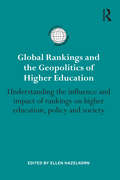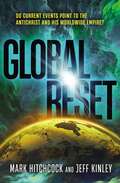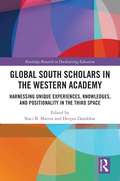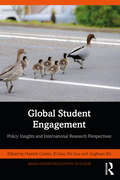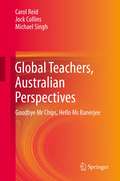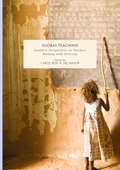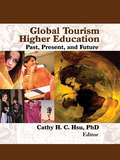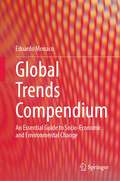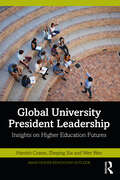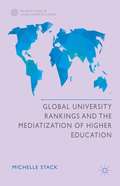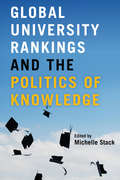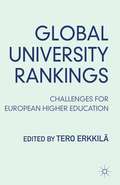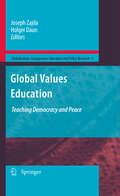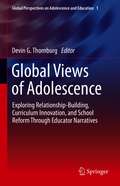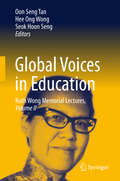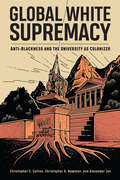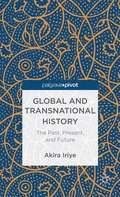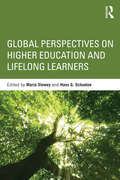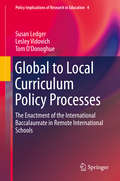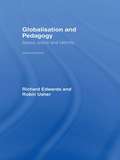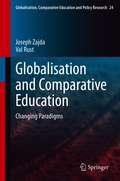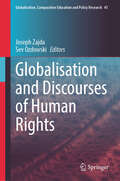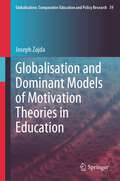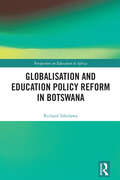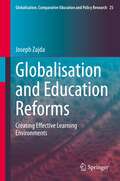- Table View
- List View
Global Rankings and the Geopolitics of Higher Education: Understanding the influence and impact of rankings on higher education, policy and society (International Studies in Higher Education)
by Ellen HazelkornGlobal rankings and the Geopolitics of Higher Education is an examination of the impact and influence that university rankings have had on higher education, policy and public opinion in recent years. Bringing together some of the most informed authorities on this very complex issue, this edited collection of specially commissioned chapters examines the changes affecting higher education and the implications for society and the economy. Split into four interrelated sections, this book covers: The development of rankings in higher education, how they have impacted upon both the production of knowledge and its geography, and their influence in shaping policymaking. Overviews of the significance of rankings for higher education systems in Europe, Asia, Africa, Russia, South America, India and North America. An analysis of rankings in relation to key concerns that pervade contemporary higher education. Examination of the role rankings are likely to play in the future directions for higher education. This is a significant scholarly work that analyses in depth an important development in higher education systems, and which is likely to have an important influence upon how we understand the higher education policy-making process – past, present and future. It provides new analysis and conceptual understanding for researchers, and firm evidence for policy makers to use when addressing the value of rankings in measuring the quality of their institutions. Besides bringing together a powerful cast of academics, this book incorporates contributions from heads of important international higher education organisations – from both those involved in making and also in administering key decisions. This timely, reflective and accessible book forms crucial reading for those studying the subject of rankings, as well as the broader implications and unintended consequences of rankings on national higher education policies. Extending beyond academic researchers and students, this book will also be of significant interest to policymakers, higher education leaders and key stakeholders.
Global Reset: Do Current Events Point to the Antichrist and His Worldwide Empire?
by Mark Hitchcock Jeff KinleyGlobal Reset will open readers&’ eyes and alert them to how world leaders are using the &“Great Reset&” agenda to seize pandemics, natural disasters and catastrophes, civil disorder, political unrest, and other current events to reshape every facet of life—all pointing toward the universal economy and godless global government of the Antichrist. COVID unleashed a cascade of consequences that are now reaching far beyond the pandemic itself. Governments have begun leveraging the coronavirus and even the vaccine as a power grab, setting the stage for further intrusions in the future. These accelerants are driving the world to the precipice of fundamental, irreversible transformation. The winds of change are blowing. Tectonic shifts are underway at every level. These realities are alarming by themselves. And yet, there remains a still deeper, more sinister agenda imbedded within. According to prophecies found in the Bible, a one-world government will indeed emerge in the end times. According to the book of Revelation, a future unified government will encompass the whole earth, and Satan himself will be behind it for the ultimate purpose of ruling over all the earth and being worshipped by its inhabitants. While we aren&’t in the end times, we&’re on the edge of the precipice. In Global Reset, readers will discover:The &“Great Reset&” agenda that sets the stage for the end time scenario prophesied in ScriptureHow China and other great nations are beginning to play a dominant role in international, socioeconomic, and political dynamicsPossible scenarios regarding America in the end times and what believers can do to stem the tide of declineGod&’s great reset planned for planet earth and humanity—the millennial reign of Christ Every person&’s needs for an eternal personal reset that can come only through Jesus Christ Prepare yourself spiritually and arm yourself with information. Find answers to the questions everyone should be asking about current world events and how they may be ushering in Christ&’s return.
Global South Scholars in the Western Academy: Harnessing Unique Experiences, Knowledges, and Positionality in the Third Space (Routledge Research in Decolonizing Education)
by Staci B. MartinBy foregrounding the voices and experiences of scholars from the Global South who have migrated to institutions in the Global North, this volume theorizes the "third space" as a unique, rich, and generative position in the Western academy. Global South Scholars in the Western Academy engages a range of critical methodologies to explore the challenges that Global South scholars have faced in establishing themselves in academic settings in the Global North. The text identifies the unique position that scholars have come to adopt "in-between" North and South and theorizes this positionality as a "third space", which is carved out by academics negotiating personal, professional, and cultural belonging. This liminal subject position, enriched by experiences of migration, racialization, poverty, and difference, is shown to drive knowledge-production and justice-orientated approaches in the academy. This book provides a new and overdue perspective on the experiences and contributions of Global South scholars in the academy. It will be of interest to academics, researchers, and scholars with an interest in critical theory, indigenous and multicultural education, the sociology of education, and higher education.
Global Student Engagement: Policy Insights and International Research Perspectives (Asian Higher Education Outlook)
by Hamish Coates Fei Guo Jinghuan Shi Xi GaoDrawing together major global studies from leading researchers, this book presents novel results, ideas, and developments from the world’s largest collaborative study of student engagement in higher education. It builds insight into contemporary higher education practice, policy, and research. The chapters are written by experts who lead student engagement research in nine diverse countries in Asia Pacific, North and South America, Europe and Africa. The book presents analysis, results, benchmark data, and case studies. It deep-dives into research programs, analytical capabilities, empirical situations, and development trajectories. The book updates earlier publications and charts emerging perspectives and development opportunities. The research contributions are for students of higher education, as well as for policymakers, advisors, and university administrators. Higher education practitioners and leaders around the world will enjoy this book.
Global Teachers, Australian Perspectives: Goodbye Mr Chips, Hello Ms Banerjee
by Michael Singh Jock Collins Carol ReidThis is the first book on global teachers and the increasingly important phenomenon of 'brain circulation' in the global teaching profession. A teaching qualification is a passport to an international professional career: the global teacher is found in more and more classrooms around the world today. It is a two-way movement. This book looks at the growing importance of immigrant teachers in western countries today and at teachers who exit from western countries (emigrant teachers) seeking teaching experience in other countries. Drawing on the international literature in Europe, North America, Asia and elsewhere supplemented by rich insights derived from recent Australian research, the book outlines the personal, institutional and structural processes nationally and internationally underlying the increasing global circulation of teachers. It identifies the key drivers of global teacher mobility: a range of factors including family, lifestyle, classroom experience, travel, opportunities for advancement, discipline, linguistic skills, taxation rates, cultural factors and institutional frameworks and policy support. The book is the first detailed contemporary account of the experiences of Australian immigrant and emigrant teachers in the schools and communities where they teach and live. It makes an important and original theoretical and empirical contribution to the contemporary fields of sociology of education and immigration studies.
Global Teaching: Southern Perspectives on Teachers Working with Diversity (Education Dialogues with/in the Global South)
by Carol Reid and Jae MajorAt a time when social, cultural and linguistic diversity has become a characteristic of education systems around the world, this timely text considers how teacher education is responding to these developments in the context of increased mobilities within and across national boundaries. This collection draws together the work of scholars, from a range of urban, rural and national contexts from the Global South and North, who engage in dialogue about diversity and knowledge exchange. It includes perspectives from multiple contexts using a range of frameworks that cohere around attention to issues of equity and social justice, and focuses on the macro level dynamics (policy, theory, global governance) as well as meso (institutional practices) and micro dimensions (professional identities, cultural, and identity transformation). The authors explore these dynamics and dimensions through mobilities of teachers and students, cosmopolitan theory, indigenous epistemologies, language ecology, professional standards policy discourses, and critical analyses of frameworks including postcolonialism, multiculturalism and culturally responsive and relevant pedagogical approaches.
Global Tourism Higher Education: Past, Present, and Future
by Cathy Hsu C.H.Get an in-depth understanding of tourism education-worldwide!Global Tourism Higher Education: Past, Present, and Future extensively reviews tourism education on a global basis, focusing on the history, development, current status, challenges, and opportunities now present in various regions and countries. Leading international authorities discuss program administration, curriculum offering, faculty qualifications, and student learning in tourism higher education programs, exploring issues both specific to their own region as well as common to other areas around the world. This unique book offers educators and students a valuable informative view of the historical development, present situations, and future directions of tourism education.The main ingredient in successfully providing a quality tourism product is highly qualified, fully trained people. Global Tourism Higher Education compiles an impressive collection of interdisciplinary perspectives exploring various directions different countries are traveling on the road to quality tourism education. Chapters reveal the numerous challenges faced by developing regions as well as more mature tourism education locations. This book provides a useful overview of education strategies around the world, exploring educational issues that are common across borders. Countries and regions reviewed include Canada, the British Isles, Austria, Switzerland, Israel, Turkey, China, Hong Kong, Taiwan, Thailand, Korea, and Australia. The book includes extensive references and graphs and tables to ensure understanding of research.Topics in Global Tourism Higher Education include: past, present, and future directions of tourism education in Canada, Hong Kong, and Taiwan five educational and tourism environments in the British Isles differences and similarities in tourism educational development in Switzerland and Austria accreditation processes of local academic programs in Israel reforms needed in Turkey&’s higher education system the hierarchy of educational programs in China with suggestions for the future the problem of the quality of tourism graduates in Thailand the distinctive niche of Australian tourism education much more!Global Tourism Higher Education: Past, Present, and Future is timely, horizon-expanding reading perfect for tourism researchers, educators, students, higher education administrators, government education departments, and anyone around the world interested in developing tourism education programs.
Global Trends Compendium: An Essential Guide to Socio-Economic and Environmental Change
by Edoardo MonacoThis Compendium was conceived as a “pocket compass”, a practical guide that may help readers to orientate themselves while they explore global affairs and attempt to make sense of the highly interconnected, multidimensional challenges of contemporary human development. The book is intended to be an accessible, concise, yet comprehensive reference for anyone who hopes to better understand today’s world and its dramatic complexity. The aim is to highlight a relevant selection of the demographic, socio-economic, geo-political, and environmental macro-dynamics that define our time, and to explore in a practical way the indicators that can be used to monitor their evolution over time. In general, this project stems from the need to apply “systemic thinking” to the study of the world and to develop a holistic perspective that can bridge the gap that for too long has existed across academic disciplines and their respective focuses. The macro-trends featured in the book shed light, in particular, on the change that has been occurring over time in the vast Global South – a portion of the globe that accounts for over 80% of the world’s total population. The book’s ultimate – although not exclusive – target audience is undoubtedly composed of undergraduate students of subjects such as political science, international affairs, international development, human geography and the like. In addition, the Compendium may benefit professionals in both public and private organisations as well as members of the general public seeking to acquire "global development literacy" in manners that are academically sound, but also accessible and concise.
Global University President Leadership: Insights on Higher Education Futures (Asian Higher Education Outlook)
by Hamish Coates Zheping Xie Wen WenThis book unlocks mysteries surrounding university presidents. Presidents have a large and growing influence on world and academic affairs. Yet until now, little has been revealed about how they enact their roles, how they capture motivation and academic energy, and their views on higher education. This book sheds light on these critical topics, revealing insights from in-depth interviews with presidents of nineteen globally focused universities from thirteen countries. The book presents the interview transcripts and surrounds these with interpretative commentary. Underpinned by leadership theory and framed by analysis, the book provides glimpses into how top leaders think, how presidents manoeuvre through their careers, how leaders form and run productive teams, and opportunities for research and innovation. Common themes and challenges are identified. The presidents reflect on university landscapes, strategic outlooks, the formation of executive teams, online teaching, funding, industry engagement, sustainability, grand challenges, and interdisciplinarity. This book is for professionals and scholars who are interested in education, universities, public policy, science and humanities, and global affairs.
Global University Rankings and the Mediatization of Higher Education (Palgrave Studies in Global Higher Education)
by Michelle StackHigher Education Institutions simultaneously critique and participate in national and international rankings of universities. However, this creates a difficult situation since if universities do participate in rankings they acquiesce to a system based in media logics that has little to do with academic norms of research. If they do not participate in the rankings they risk losing public funding, students and donors in an increasingly competitive and globalized environment. This book delves into the influence of journalists, business tycoons and multinational corporations in defining what world class is and how it will be measured. Rankings provide us with a rich study for understanding how universities define, deploy and manage their assets and liabilities in a mediatized globalized economy.
Global University Rankings and the Politics of Knowledge
by Michelle StackFor many institutions, to ignore your university’s ranking is to become invisible, a risky proposition in a competitive search for funding. But rankings tell us little if anything about the education, scholarship, or engagement with communities offered by a university. Drawing on a range of research and inquiry-based methods, Global University Rankings and the Politics of Knowledge exposes how universities became servants to the education industry and its impact. Conceptually unique in its scope, Global University Rankings and the Politics of Knowledge addresses the lack of empirical research behind university and journal ranking systems. Chapters from internationally recognized scholars in decolonial studies provide readers with robust frameworks to understand the intersections of coloniality and Indigeneity and how they play out in higher education. Contributions from diverse geographical and disciplinary contexts explore the political economy of rankings within the contexts of the Global North and South, and examine alternatives to media-driven rankings. This book allows readers to consider the intersections of power and knowledge within the wider contexts of politics, culture, and the economy, to explore how assumptions about gender, social class, sexuality, and race underpin the meanings attached to rankings, and to imagine a future that confronts and challenges cognitive, environmental, and social injustice.
Global University Rankings: Challenges for European Higher Education
by Tero ErkkiläGlobal University Rankings explores the novel topic of global university rankings and their effects on higher education in Europe. The contributions in this volume outline different discourses on global university rankings and explore the related changes concerning European higher education policies, disciplinary traditions and higher education institutions. The first global university rankings were published less than a decade ago, but these policy instruments have become highly influential in shaping the approaches and institutional realities of higher education. The rankings have portrayed European academic institutions in a varying light. There is intense reflexivity over the figures, leading to ideational changes and institutional adaptation that take surprisingly similar forms in different European countries. The contributions in this book critically assess global university rankings as a policy discourse that would seem to be instrumental to higher education reform throughout Europe.
Global Values Education
by Joseph Zajda Holger DaunThis, the seventh in the 12-volume series Globalisation, Comparative Education and Policy Research, presents scholarly research on major discourses in values education globally. It is an accessible, practical yet scholarly resource that explores international concerns in the field of globalisation and comparative education. A vital sourcebook of ideas for researchers, practitioners and policy makers in values education, multiculturalism and moral education, the volume also provides a timely overview of current issues affecting values education, comparative education and education policy research in the global culture. Drawing on recent studies in the areas of globalisation, equity, social justice, and the role of the state, the book critically examines the interplay between values education, globalisation, and dominant ideologies, and reflects on its implications for policy. It goes further to explore conceptual frameworks and methodological approaches applicable in the research covering values education, globalisation, equity, and multicultural education. Individual chapters critically analyse the dominant discourses and debates pertaining to values education, multiculturalism and relevant comparative education discourses. In addition, the book evaluates the ambivalent and problematic relationship between the state, its dominant models of values education, globalisation and social change. The authors employ a number of diverse paradigms in comparative education research, ranging from critical theory to globalization. By focusing on ideology, globalisation and democracy, they attempt to examine critically both the reasons for, and the outcomes of, education reforms in the domain of values education, policy change and transformation. In doing so, they provide a more informed critique of Western-driven models of accountability, quality and school effectiveness.
Global Views of Adolescence: Exploring Relationship-Building, Curriculum Innovation, and School Reform Through Educator Narratives (Global Perspectives on Adolescence and Education #1)
by Devin G. ThornburgThis book addresses what teachers and school leaders from a dozen countries see as the social and emotional strengths, interests and needs of adolescents in their schools and communities; how they innovate their programs and practices to respond to their students’ lives. The book also describes how educators themselves benefit from social and emotional supports to be responsive. Rather than assume that there are universal themes in adolescents’ lives, the book is intended to illuminate the local, contextual, and powerful insights of educators daily working with students. In many intentional respects, each serves as an action research study with an effort to better the process and outcomes of their students’ growth and learning as well as to enrich the classroom. The chapters are organized by themes, ranging from challenges adolescents face in that particular locale to curriculum work that is project-based, transdisciplinary, and tied to the communities where the adolescents live. ‘The voices of adolescents, particularly with regard to their social and emotional development have been neglected in the literature. Thus, we know very little about their feelings and personal experiences as they progress through their schooling. A book such as this will be beneficial in terms of providing a contribution to this field, thereby increasing our understanding of the issues faced by adolescents across countries and cultures.’ Peggy L. Anderson, Ph.D., Metropolitan State University of Denver ‘The outstanding strength of this book is quite precisely its international scope: here is an anthology that lives up to the claims made by its title. Anyone interested in either adolescent development or Social and Emotional Learning in real world as opposed to abstract settings will appreciate the breadth of experience described.’ Mokhtar El Maouhal, Laboratoire de Recherche sur les Langues et la Communication
Global Voices in Education
by Oon Seng Tan Hee Ong Wong Seok Hoon SengThis book brings together selected lectures given by eminent educationalists in memory of Ruth Wong, an influential figure in the field of education. The lectures represent the powerful ideas seeded by Dr Wong and address the challenges of education in Singapore's journey from a textbook case of poor education to a world-class educational system. The educational standard that we enjoy today was only possible thanks to visionary thinking and missionary zeal. This collection addresses key themes and issues in learning, schooling, teaching, teacher education, educational research and policy innovation, making it a must-read for educators, educational leaders and policy makers interested in providing uplifting education for the next generation of learners.
Global White Supremacy: Anti-Blackness and the University as Colonizer
by Christopher S. Collins Alexander Jun Christopher B. NewmanKnowledge is more expansive than the boundaries of the Western university model and its claim to be the dominant—or only—rigorous house of knowledge. In the former colonies of Europe (e.g., South Africa, Brazil, and Oceania), the curriculum, statues, architectures, and other aspects of the university demonstrate the way in which it is a fixture in empire maintenance. The trajectory of global White supremacy is deeply historical and contemporary—it is a global, transnational, and imperial phenomenon. White supremacy is sustained through the construction of inferiority and anti-Blackness. The context, history, and perspective offered by Collins, Newman, and Jun should serve as an introduction to the disruption of the ways in which university and academic dispositions have and continue to serve as sites of colonial and White supremacist preservation—as well as sites of resistance.
Global and Transnational History
by Akira IriyeIt is no exaggeration to say that the study of history has been transformed significantly during the last twenty-odd years. Akira Iriye, the world authority on transnational history, examines the emergence and growth of global and transnational history, away from more traditional, nation-centred perspectives.
Global perspectives on higher education and lifelong learners
by Hans G. Schuetze Maria SloweyThe global expansion of participation rates in higher education continue more or less unabated. However, while the concept of lifelong learning has figured prominently in national and international educational policy discourse for more than three decades, its implications for the field of higher education has remained relatively underdeveloped. This book focuses on a particular dimension of the lifelong learning: higher education for those who have not progressed directly from school to higher education. Some will embark on undergraduate programmes as mature students, part-time and/or distance students; others wish to return to higher education after having completed (or not completed) a previous academic programme, while increasing numbers participate in postgraduate and continuing studies for a complex mix of professional and personal reasons. Adopting a comparative and international longitudinal perspective which goes beyond a snapshot view by building on the cases of a core group of ten OECD countries, this timely book investigates the ways in which important new developments impacting on higher education crystallise around the lifelong learning agenda: new technology and open source resources; the changing role of the state and market in higher education; the blurring of public and private boundaries; issues of equity and access in a time of global economic turmoil; the increased emphasis on research and international league tables; the changing nature of the education; and, the complex interaction of international, national and regional expectations which governments and other stakeholders have of universities and other public and private institutions of higher education. While focusing on the situation in Canada, USA, Japan, Australia, New Zealand and a wide variety of European countries, the book also assesses the issues from the perspective of developing countries. Launched by the Irish Minister of Education, this timely book is a must read. Find out more here: http://www4.dcu.ie/ovpli/herc/book_launch
Global to Local Curriculum Policy Processes
by Lesley Vidovich Susan Ledger Tom O'DonoghueThis book explores the dynamics of curriculum policy processes involved in the adoption, production and enactment of the International Baccalaureate Primary Years Programme (IBPYP), accredited by the International Baccalaureate Organization (IBO). It addresses deficits in current literature and provides insight into and the complexities involved within a framework that takes cognisance of the relationships between global, regional, national and local levels of education policy processes. In doing so, it contributes to the current body of research on international education, remote education and policy processes. The IBPYP is one of the three programmes that go to make up the increasingly popular suite of programmes offered by the IBO. Given the exponential growth of international schools caused by an ever changing globalized world and a mobile workforce, international curriculum policy is becoming more complex. This has lead to a recognition of the need for a range of policy analysis studies in the field. The study presented in this book was conceptualised in the light of such recognition. This relatively uncharted field has been explored by focusing on one of the most 'unusual' settings. Accordingly, the adoption, production and enactment of the IBPYO at three remote international schools has been examined. The study also addresses how the phenomena of 'international schools' and 'remote schools' complement or compete with, each other. This results in a better understanding of the educational policies informing both 'international schools' and 'remote schools' and the interconnectivity that might exist between them.
Globalisation & Pedagogy: Space, Place and Identity
by Robin Usher Richard EdwardsWith different pedagogic practices come different ways of examining them and fresh understandings of their implications and assumptions. It is the examination of these changes and developments that is the subject of this book. The authors examine a number of questions posed by the rapid march of globalisation, incuding: What is the role of the teacher, and how do we teach in the context of globalisation? What curriculum is appropriate when people and ideas become more mobile? How do the technologies of the internet and mobile phone impact upon what is learnt and by whom? The second edition of this important book has been fully updated and extended to take account of developments in technology, pedagogy and practice, in particular the growth of distance and e-learning.
Globalisation and Comparative Education: Changing Paradigms (Globalisation, Comparative Education and Policy Research #24)
by Joseph Zajda Val RustThis book focuses on discourses of globalisation in comparative education research and the politics of education reforms. It analyses and evaluates the shifts in methodological approaches to globalisation and education reforms, as reflected in comparative education research and their impact on education policy and pedagogy. The book covers topics such as globalisation and comparative education, globalisation as a multidimensional construct, methods and methodologies in comparative education, the moral face of post-structuralism, and school reforms in the age of globalisation. It offers a critical analysis of education policy reforms.The book demonstrates a complex nexus between globalisation, ideology and education reforms. On one hand, democratisation and progressive pedagogy is equated with equality, inclusion, equity, tolerance and human rights, while on the other hand, globalisation is perceived – by some critics at least – to be a totalising force that is widening the socio-economic status (SES) gap and cultural and economic capital between the rich and the poor, and bringing power, domination and control by corporate bodies and powerful political, economic and educational organisations. The perception of globalisation as dynamic and multi faceted processes clearly necessitates a multiple perspective approach in the study of comparative education globally. This book contributes in a very scholarly way, to a more holistic understanding of the nexus between globalisation, comparative education research and education reforms.
Globalisation and Discourses of Human Rights (Globalisation, Comparative Education and Policy Research #45)
by Joseph Zajda Sev OzdowskiThis book examines dominant discourses in human rights education globally. Using diverse paradigms, ranging from critical theory to discourse analysis, it examines major human rights education reforms and policy issues in a global culture. It also focuses on the ambivalent and problematic relationship between human rights education discourses, ideology and the state. The book discusses democracy, ideology and human rights, which are among the most critical and significant factors defining and contextualising the processes surrounding human rights education globally. It critiques human rights education practices and policy reforms, illustrating the shifts in the relationship between the state, ideology, and human rights education policy. The book also examines developments in research concerning human rights education. Readers will gain a more holistic understanding of the nexus between human rights education, and dominant ideologies, both locally and globally. The book also provides easily accessible, practical yet scholarly insights into international concerns in the field of human rights education in the context of global culture.
Globalisation and Dominant Models of Motivation Theories in Education (Globalisation, Comparative Education and Policy Research #39)
by Joseph ZajdaThis book analyses discourses of the use of motivation theories in schools globally. It focuses on the overall impact of motivation theories on teachers, students’ engagement, well-being, academic excellence, standards, equity and global competitiveness. It examines the role of motivation theories impacting on teachers and students in the classroom, and the overall impact of cognitive, social cognitive, affective and psycho-motor domains, used to motivate students to improve their performance in the classroom.The book analyses such topics as Behaviourism, a major motivation model to improve performance in schools, cognitive theories for creating engaging learning environments, including achievement motivation, Social cognitive theories for improving engagement and motivation, social constructivism to improve students’ motivation and academic achievement, humanistic approaches for creating effective motivational environments, the use of discourse analysis in understanding motivation, and dominant values used in motivation in inclusive schools. This book contributes in a very scholarly way, to a more holistic understanding of the nexus between globalisation, dominant models of motivation, and students’ engaging learning environments, and their academic achievement.
Globalisation and Education Policy Reform in Botswana (Perspectives on Education in Africa)
by Richard TabulawaThis book uses the global–local dialect approach to explicate education policy reform in Botswana and interrogates the practical effects of the various education policies on curriculum, pedagogy and governance of the Botswana General Education system. Considering the effect of three reform policies since Botswana’s Independence in 1966, the book evaluates the performance of each of the policies and examines their consequences in terms of the interplay of global forces and domestic pressures. The result of this interplay has been an education landscape that, while reflecting globally circulating education discourses, markedly differs from those same discourses. The book argues that the State in Botswana has appropriated education policy to legitimate itself in times of crisis and that each policy has improved access to general education but, collectively, have failed to improve its quality, making suggestions for how this can be improved in the future. As the first book of its kind to delve into education in Botswana from a single-authored critical lens, the book will be a highly relevant reading for academics, researchers and post-graduate students of African education, comparative education, education policy and curriculum studies.
Globalisation and Education Reforms: Creating Effective Learning Environments (Globalisation, Comparative Education and Policy Research #25)
by Joseph ZajdaThis book analyses discourses of effective learning environments globally. It focuses on the student’s cultural identity and academic achievement, the significance of cultural and social capital to student’s academic achievement, motivational strategies enhancing engagement and performance, effective teaching strategies, and quality in education for all. The book discusses and evaluates the shifts in methodological approaches to effective learning environments and globalisation. It analyses such topics as the students’ cultural identity and achievement, motivational strategies for creating effective learning environment, constructivist pedagogy for critical thinking, dimensions of discrimination in schools globally, intelligence testing and the effects on academic achievement, and values education in the classroom. The book evaluates the shifts in methodological approaches to globalisation and effective learning environments globally, and their impact on education policy and pedagogy. It contributes in a very scholarly way, to a more holistic understanding of the nexus between globalisation, comparative education research and effective learning environments education reforms.
